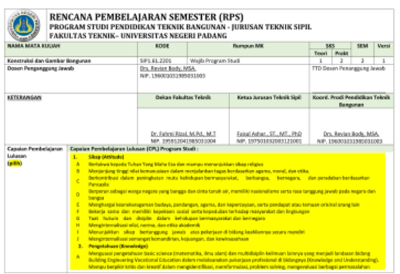The Effectiveness of Learning using the Case Method in Building Construction Drawing Courses
DOI:
https://doi.org/10.24036/cived.v11i1.513Keywords:
Effectiveness, Case Learning Method, Building Drawing Construction CourseAbstract
College tall is one of the essential pillars in shaping the future generation, the successors of our nation. They must be capable of thinking quickly and precisely to tackle every problem and challenge in life. As challenges, demands, and competition, particularly in the world of work, continue to escalate, it becomes increasingly crucial for individuals to adapt their learning methods to keep pace with current curricula and developments. One of the latest advancements in the realm of education, especially in higher education, is the implementation of the Independent Campus Learning (MBKM) curriculum. MBKM represents a significant breakthrough, and all students studying at universities must adapt to it. In the Building Engineering Education Study Program at FT-UNP Civil Engineering Department, subjects like Building Drawing Construction are offered, focusing on developing essential skills. This subject covers a range of materials, from understanding soil characteristics for building foundations to drawing construction plans for various building components. Through methods like action research, students engage in three cycles of study, involving planning, implementation, observation, and reflection. Research conducted on Semester IV students in the 2021/2022 Academic Year at Padang State University revealed significant improvements in student performance. In Cycle I, the class average score was 72.3, with subsequent cycles showing steady progress, reaching an average score of 81.15 in Cycle III. These results demonstrate the effectiveness of the action-based learning approach in enhancing students' understanding and performance in Building Drawing Construction. It underscores the importance of dynamic teaching methodologies in preparing students for the challenges of the future workforce. With continued refinement and adaptation, initiatives like MBKM can play a pivotal role in shaping a skilled and competent workforce for tomorrow's society.
Downloads
References
Anderson, E. & Schiano, B. (2014). Teaching with Cases: A Practical Guide. Massachusetts: Harvard Business School Publishing.
A.M. Sardiman. (2011). Interaction and Motivation of Teaching and Learning. Jakarta: Rajawali Pres.
Arikunto, S. 2006. Research Procedure of a Practical Approach, Jakarta: Rineka Cipta.
Arikunto, Suharsimi, Classroom Action Research, Jakarta: Bumi Aksara, 2006.
Creswell, J. W., and Guetterman, T. C (2019), Educational Research; Planning, conducting, and evaluating quantitative and qualitative research, 6th edition, Pearson, New York.
E. Flynn and J. D. Klein, "The influence of discussion group in a case-based learning environment, 'educatonal technology research and development, vol. 49, no.3, pp. 71-86,2001.
Ertmer, P. A. & Russell, J. D. (1995). Using Case Studies to Enhance Instructional Design Education. Journal Educational Technology - Vol. 35, No. 4.
Fitrah, M., & Luthfiyah. (2017). Research methodology: Qualitative research, classroom actions & case studies. Sukabumi: CV Jejak.
Mayer, R. E. 2002. The promise of educational psychology volume II: teaching for meaningful learning, New Jersey: Pearson Education, Inc.
M. Rusdi. 2018. Research on Educational Design and Development. King Grafindo
Soegoto, E. S. (2013). Marketing Research the Smart Way to Solve a Problem. Elex Media Komputindo.
Stanley, T. (2019). Case Studies and Case-Based Learning: Inquiry and Authentic Learning That Encourages 21st-Century Skills. Texas: Prufrock Press Inc.
Sugiyono. (2018). Quantitative, Qualitative, and R&D Research Methods. Bandung: Alfabeta.
Yin, Robert K, 2006, Case Study Research Design and Methods. Mudzakir, Djuzi (translator). 2006. Case Study of Design and Method, First Edition, Jakarta, PT Raja Grafindo Persada,
Yin, Robert K, Design & Method Case Study, PT. Raja Grafindo Persada, Jakarta, 2013.

Downloads
Published
How to Cite
Issue
Section
License
Copyright (c) 2024 Yuwalitas Gusmareta, Fani Keprila Prima, Muvi Yandra, Agri Americo Agammuddin, Prima Zola

This work is licensed under a Creative Commons Attribution 4.0 International License.







2.jpg)
